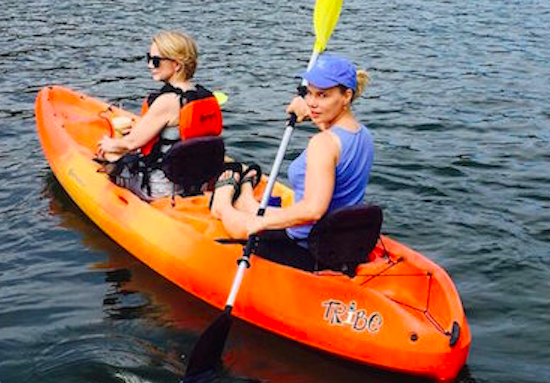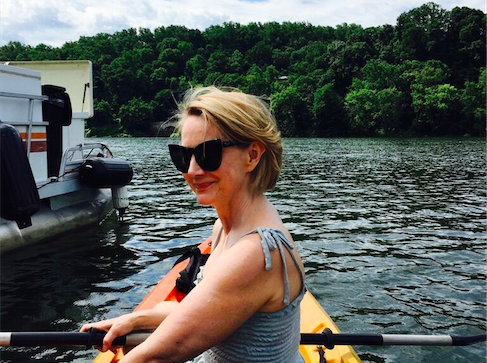Meditating on the Potomac: First Steps to Regaining My Identity

I'm sharing my journey toward getting my life back, after some rough times, losing my health, and my sense of self, because I know the process can be difficult - and even painful - for anyone. I know, because it's been my job - and my passion - for more than 25 years: helping my clients transform their health and their lives to better themselves and to increase their happiness. Ironically, I haven't experienced these joys for myself for quite a while, so it's my turn to tough it out. And I can tell you, after many setbacks, it's not for sissies!
In my story's first installment, I described the importance of mindfulness as a foundation for self understanding and successful life change. It reduces anxiety, helps you focus, and leave worries about the past and future behind. This helps you work through problems more effectively, according to scientific research from the National Institutes of Health. I needed to keep my focus on the present, to relax, to feel hopeful, and to force myself out of my depression. I needed to be willing to work at overcoming my exhaustion after almost two years of knee and back pain, ultimately leading to surgeries on both, and sidelining me for the duration.

You see, I spent a lifetime being physically active. This was a part of my identity, a way I excelled in the world. I started gymnastics in pre-school (it was called "tumbling" then). I went on through my adulthood to continue practicing gymnastics, cheerleading, dance, swimming, scuba, fencing, climbing, skating, archery, aerobics, strength training, stand up paddle boarding, yoga ...You name it, I've done it, and excelled almost immediately at anything I tried (even basketball, though I'm 5'2").
It's funny that I only recently realized that this loss of my physicality may have been the underlying cause of my depression and endless exhaustion - because it was an integral part of my identity and self-worth. I never realized how much pride I took - wrongly or rightly - in being fit, active, and in exceptional (not just good) shape. I was always a leader, a teacher, and set the example for thriving and living a healthy life. I bounced back from negative experiences easily, and taught my clients to do the same. But somehow I couldn't this time. I actually felt embarrassed to let anyone know, outside a few of my closest friends and family, just how badly I felt. I stopped exercising (by necessity), I gained weight, I stopped going out, I stopped socializing, and even dealing with my business. I isolated myself, even though I knew this behavior was hurting my health in every way.
I finally came to understand why I was not recovering as expected while listening to a friend's account of his wife's reaction to the fear of potentially losing her singing voice (she's a singer) after the successful removal of a stage 1, non-malignant cancer on one of her vocal cords. The experience left her inconsolable, silent, uncommunicative, miserable, and angry with everyone. No amount of love, support, or reassurance from the experts helped. Her reaction and behavior went beyond normal proportions. Why? Perhaps because using her voice was an integral part of her identity, and the fear of losing it, even an irrational fear, was too frightening to face, let alone talk about, or deal with.
Facing and working through that kind of loss and fear can be paralyzing. Admittedly, it's taken me way too long to begin my recovery. And every day I'm too tired - or too stubborn - to advance, I damage myself further.
If you inexplicably don't take steps to improve your life in ways you know would be helpful - and your loved ones are encouraging - perhaps exploring how your self identification has been or will be affected, will help get you started. This is a major barrier to overcome for anyone trying to change a habit, even one which is self-destructive.
Mindfullness has been essential for me to finally start taking the small steps toward getting my life back, and feeling like myself again. (Funny, taking small steps is the cornerstone of my life-change programs, and my book, Diet Simple.) Studies clealry show you can achieve mindfulness through meditation. But I believe any activity that absorbs your heart and mind, relaxes you, and focuses you on the present moment, can improve your mindfulness. Mindfulness allows you to work through your worries more effectively, to let go of thoughts and feelings that won't help, while concentrating on positive behaviors that will advance you toward your long term goal of increased happiness, however you define it.
This weekend, mindfulness came to me through kayaking with a friend on the beautiful Potomac River. What wonderful resources in Washington, DC (we rented a kayak from the Key Bridge Boathouse)! I was able to step into another world, completely relax, and focus on Mother Nature, just a few blocks from home. A couple of weekends ago, I escaped to the Pennsylvania countryside. Music and reading elevate me too (anything but the news, please).
Personalize your way of becoming more mindful so you can start making small steps to improve your life. And try to be patient with yourself.
More later ...
